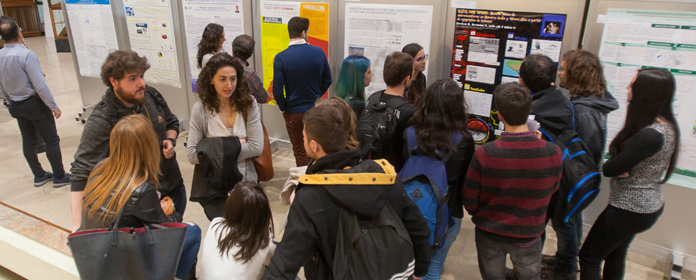Science as told by scientists
The University brings together 200 researchers and 69 projects at the X workshop of research in Experimental and Health Sciences

The conference of research in Experimental and Health Sciences of the University of Navarra celebrates its tenth anniversary, bringing together researchers at Hexagon Building training to show their projects through posters and plenary sessions. This year 69 papers have been presented from Schools in Science, Medicine, Pharmacy and Nutrition, and Nursing.
This is the case of the project on Forensic Entomology -the science that studies insects and arthropods as scientific evidence- of the student of doctorate Sandra Pérez Martínez, graduate in Biology. As the future doctor explains, "the goal of this work is to try to develop a tool applicable to samples of forensic interest -such as corpses- using mites to complement the estimation of the time at which these animals appear and, therefore, to know more accurately the time of death".
"Until now," the researcher continues, "in forensic sciences, insects have been used, but they are not present in all circumstances - for example, in winter, under water or inside a bag - and they also offer wide time intervals. On the other hand, mites, which are microscopic, have more access in different circumstances and also appear on specific days".
Nora Escribano - who is doing her doctoral thesis at department of Environmental Biology- presented her work on micromammals of Navarra average and the upper ribera. As she explains, "the fact that biodiversity data are now universally shared through platforms such as the Global Biodiversity Information Facility (GBIF) makes it possible to add to these networks other valuable data collected in centers or museums, such as the Zoology Museum of the University of Navarra, which contains for example more than 60,000 records resulting from the analysis of owl pellets, which give us very valuable information on the evolution and status of the species, its diversity, etc.," she explains.
Fuzzy logicThese conference, which have been attended by more than 200 researchers, aim to show the whole university community the work of research that is carried out in the different laboratories of experimental and health sciences of the University of Navarra. Also at the department of Physics and Applied Mathematics, where Carlos Bejines performs his doctorate on fuzzy logic. "Classical logic is the one that has made it possible to model premises, chains of reasoning and precise conclusions (those that only admit two states: true or false). However, this logic is insufficient in real situations where the data are imprecise, vague or even incomplete and inaccurate. This is where fuzzy logic makes sense, which, together with other tools such as neural networks or genetic algorithms, make up Soft Computing", explains the future doctor.
In fact, the presentation of his work of research consists, precisely, in explaining in an informative way the purpose and operation of fuzzy logic.
